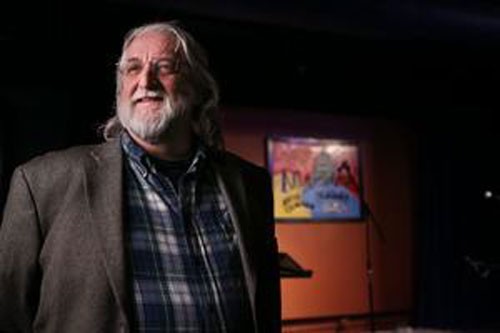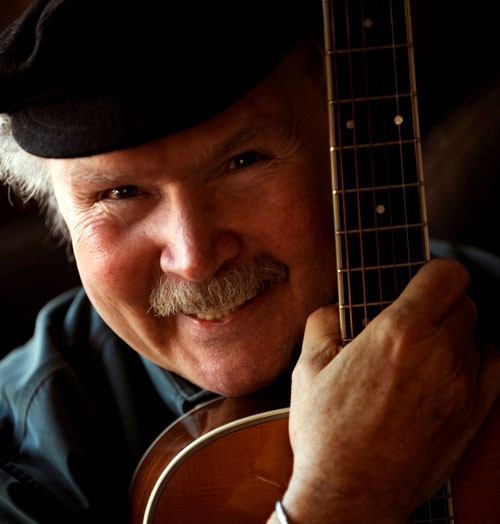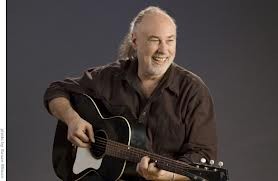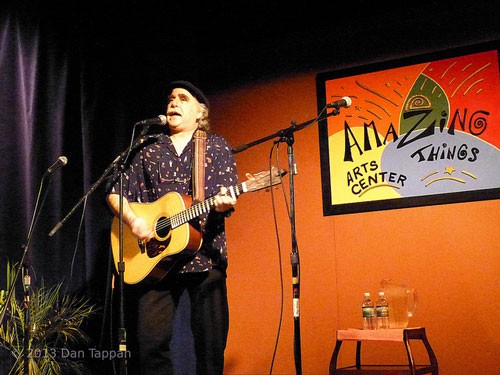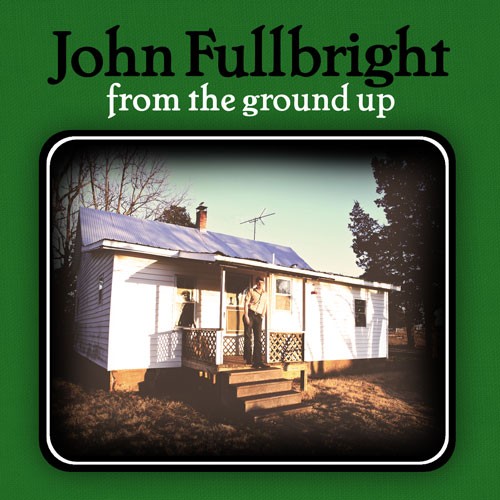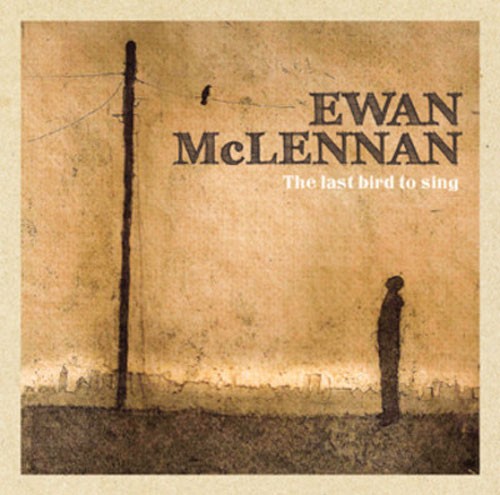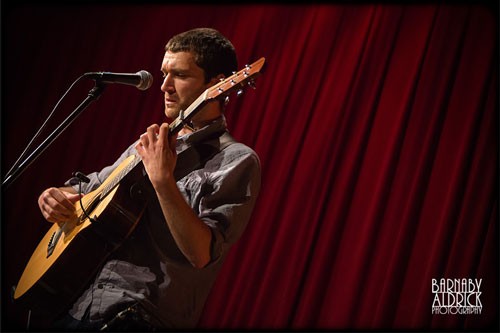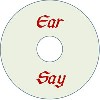Ear Say: John Fullbright and Ewan McLennan
Amazing Things Are Happening in Our World.
By: David Wilson - Apr 28, 2013
Amazing Things are happening in our world. No, really, Amazing Things are happening. I say this because a week or so ago I visited Amazing Things, an arts venue in downtown Framingham to see Tom Paxton in concert and meet the director Philip Knudsen. It got even more collegial when I met Walter Crockett who was opening for Tom and renewed acquaintance with Geoff Bartley there to accompany Tom. Also present was Boston’s premier folk journalist, Scott Alarik, reading selected parts of his current, Revival, a novel of the folk scene and a tribute to the many participants who seldom get the notice they deserve. I will write more about his book soon, but leave it now for another day.
I spent a rich half-hour or so before the show, catching up with Tom, sharing news about mutual friends and future plans and beginning to tell him a bit about the two artists, (one of whom comes from Tom’s home-grounds) whose cds I review below.
Before I knew it we were in the middle of a fascinating, at least to me, discussion of songwriting in general and Tom’s reflections on the evolution of his own development as a songwriter. For those of you who care to listen to that discussion, I will provide a link to it in an upcoming posting.
The two artists whose recordings I comment on below are interesting in their comparisons and their contrasts. Both cds garnered considerable praise and attention in 2012. Oklahoma’s John Fullbright and his release were nominated for a Grammy, and Ewan McLennan’s was one of those selected in the UK’s best of the year lists.
John Fullbright
from the ground up
Blue Dirt Records
Born in Bearden Oklahoma, attending school in Woody Guthrie’s nearby Okemah, John Fullbright, with the release of “From The Ground Up,” stakes his claim to a musical heritage of exalted status.
This cd, nominated for a Grammy, at first play generated for me the same chills, the same sense of wonder I had when I first heard Eleanor Rigby by the Beatles. One listening and I was a believer.
Every song on this CD is compelling from the opening admonition, “Gawd Above” all the way through to the closing lullaby, “Song For A Child.”
John is songster, bluesman, testifier and prophet
Woody claimed that he tried to write songs that were of the heart, or were of the mind. John breaches those barriers between the heart and mind.
He writes intelligent, coherent and meaningful lyrics and it is no wonder, if somewhat of a surprise that this self produced CD received its nomination in the Grammy’s.
Here is verse 3 from I only pray at night
And it’s funny, ain’t it funny, what ain’t funny in the dark
Its a mystery to me what my mind will see
And it’s something, ain’t it something, when you miss that mark
And you get down on your knees to pray
…or the first verse of Fat Man
In my dreams I see a fat man
On his face is a frown
He’s got money in his left hand
In his right he’s got strings that run
All over town
As he pulls on them tightly he chokes all that grows
He keeps watch day and nightly and plucks life
Like a rose.
John’s musical sensibilities far exceed the boundaries of any fixed form. He has the creative genius to synthesize gospel, blues, ballads and lullabies into a genre too expansive to be, collectively, anything but Fullbright.
Fans claim to hear echoes of Jimmy Webb, and Merle Haggard in his performance, and tout his farmboy roots in Woody Guthrie's home stomping grounds. I hear Dylan, John Prine and oddly enough here and there the sensibilities of my other favorite Oklahoma songwriter, Tom Paxton, who at moments seems to me to be a bridge between Woody and Fullbright.
John is however, an original and is no imitation of anyone else. His voice is distinctive with a timbre for which all too many vocalists would kill. To that add an intuitive talent for natural and near-perfect phrasing, and you have as compelling a vocalist as any new performer we have heard in the last few years.
His accompaniment on the instruments he plays, guitar, harmonica, bass, organ and piano add brilliant support to his singing. His sidemen on this production know how to stay out of the way and when to pile on. I might and in fact have quibbled now and again that this release is a little over produced. John’s voice is too strong to require a lot of background fill. On the other hand, his voice is so strong that it is never overwhelmed by that background. In the end that is a personal preference being exposed and no more than as noted, a quibble.
If you have yet to hear John, I think you have a wonderful surprise waiting for you. John is currently on a wide ranging tour and may very well be appearing at a venue near you within the next few months.
Here he is with Satan And Saint Paul
Ewan McLennan
The last bird to sing
Fellside Recordings
FECD250
The experience of listening to Ewan McLennan is that of recognizing the echoes of a long line of ballad singers stretching well back into the foggy mists of time. In more recent past, that list includes such as Enoch Kent, Matt McGinn, Ewan McColl and A. L. Lloyd. If those names mean nothing to you, and you are at all attracted to traditional music, you have a long afternoon’s googling and you-tubing ahead of you and I will try to provide a list of links at the bottom of this posting.
Ewan has a bonny voice as any of his Scots mates might say. It is rich and strong and melodic. He uses that voice on this release to proffer traditional ballads, some more recently written in traditional style and three originals he has penned. Another part of that above-mentioned tradition is often the exposing of social inequities and injustices. Most of Ewan’s compositions are such.
He launches his program on this cd with a sensitive rendition of Matt McGinn’s Rolling Hills Of The Borders and I’m inclined to think that his voice is not as dark or as intense as is Matt’s and suffers comparison for that fact. His guitar accompaniment on the piece is however quite intricate, interesting and delicate.
The first time I listened to his version of Banks Of Marble which many of us are familiar with from the repertoire of Pete Seeger, I wondered if I had had its origin wrong for many years. Ewan’s interpretation might have convinced us to think it a traditional British Isles complaint but his notes clearly state it is Les Rice’s song from the late ‘40s.
His three songs sit well in that company. Whistling The Esperanza tells the story and celebrates the tenacity of the Chilean miners during the recent mine collapse. The song begins and ends with the following verse.
On a still night under darkness men fastened their boots
Their headtorches flickered, their tobacco smoke rose
With the cogs and wheels whirring they were lowered below
As they whistled the Esperanza
The Last Bird To Sing steeps us in the miasma of an economy in shreds…
I awoke each morning days stretched into nights
And I lurched through a hollow routine
In the queues each week with companions I’d stand
But our fortunes had turned on our dreams
Joe Glenton relates the state’s revenge on a soldier, sick of a pointless war, and wanting the truth to be known…verse 4;
While these embers were smouldering the story unfolding
Led him to question the cause
All we have brought here and all we will leave
Are the scars and the tissues of war
And as their mission drew to a close
He vowed that he’d never return
He told his captain who threatened and screamed
That these thoughts were not a soldiers concern
Final chorus;
Joe Glenton, he was sentenced
But the criminals dance free today
They were many before him, there’ll be many after
Who question instead of obey
For all of you who complain about the state of what passes for folk music today, here is an example ready to be embraced wholeheartedly. Traditional ballads and two instrumental medleys complete the program.
One last note. The accompaniment on this production is sparse, precise and the work of iconic performers. It takes careful listening to catch the brief but stirring slide guitar of Martin Simpson, the haunting and underused vocal harmony of Karine Polwart, John McCusker’s fiddle and Laurence Blackadder’s double bass. Ewan’s vocals provide most of the melody, his guitar more often underlining the narration rather than carrying it. It is a delicate balance and McLennan carries it off with distinction.
From the album, here is Banks Of Marble
And here are the links I promised above


